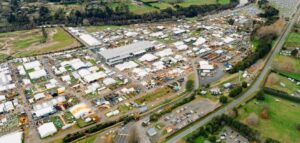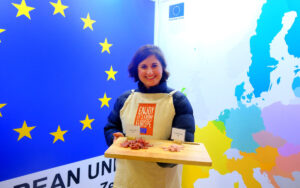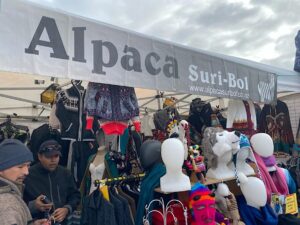Chilean executive brings international flavour to Fieldays
Marcelo Mieres came to New Zealand for a six-month break and is still here more than nine years later. Now international business executive at the NZ Agribusiness Centre, he is building the New Zealand sector’s links with the rest of the world.
Canada, or New Zealand?
The toss of a coin decided the destination of a Chilean agronomist’s holiday break.
On a Wednesday, Marcelo Mieres flipped the loose change and set his sights on New Zealand.
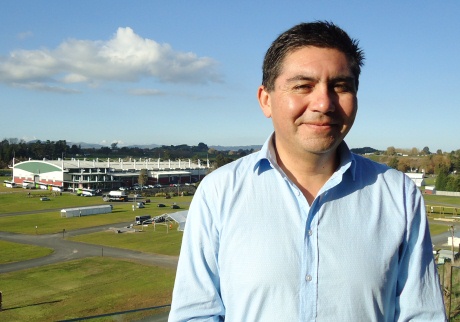
He had a six-month contract with Ohaupo business Blueberry Country by Friday.
“On Monday I quit my job and, three weeks later, I was working here in Ohaupo,” he says.
“After a few months here, [I thought] ‘well, this is fantastic. I need to be here.’”
That was in 2004.
A few years of New Zealand business experience and tertiary study later, he came back to where he started in Godzone, this time as international business executive for the NZ Agribusiness Centre.
Autumn is the busiest time of the year because he is heavily involved with Fieldays – the Southern Hemisphere’s largest agricultural event.
It is less than a month away, and Mieres is checking his emails every fifteen minutes, even on weekends.
Over the four days of the 45th year of Fieldays, more than 1000 exhibitors will promote their products and services to in excess of 120,000 visitors, and the premier feature will focus on getting down to business in the global economy.
With his international background and love for his new home, Mieres is the right man to help.
In almost ten years here, he has fallen head over heels for New Zealand.
Even when he first arrived, the striking similarities to south Chilean landscapes made him feel at home.
“The only difference was people driving on the wrong side of the road.”
Working for businesses around the Ohaupo area gave him a chance to adjust to the unique Kiwi accent, and learn few other local quirks.
During his time with a hydroponic tomato grower he was the only foreigner in the place, and he jokes that he had to adapt or die.
Were there some unexpected cultural differences?
“Learning how to eat pies, open these little tomato sauce containers that you need to squeeze, but nobody told me.”
But an exploding sauce sachet didn’t take the shine off New Zealand for this self-professed fan.
He takes visitors to have fish and chips out of a paper bag at Raglan, and claims to love everything about our country – except Marmite.
Knowing New Zealand yet having a South American background means Mieres is in a good position to observe our business culture.
Little things can make a big difference, and he says researching the person, place, and country is essential.
“Sometimes New Zealand is a little bit too relaxed on that part.”
Kiwis are also extremely trusting, and used to a style of service which they may not get in other countries.
“I remember having very, very stressful arguments with local suppliers [in Chile] just to get things done. And here you’re never going to have that type of issue. You’re never going to yell to someone to get things done. But over there, that happens. You need to understand how things work.”
Trust needs to be earned, and Kiwis’ tendency to come in and lay out terms up front can be seen by South Americans as very direct.
“Sometimes – a lot of times actually – you need to go out with that person to have a drink, have a coffee, have a conversation. It’s more than just plain business. You are creating a relationship with somebody for business. And like in any relationship, if you think that it doesn’t feel quite right, it’s not going to go right.”
Developing international relationships is a hot topic for the agricultural community, and this year’s Fieldays focus.
Mystery Creek events manager Vanessa Richmond says global business was a clear winner at the theme brainstorming session.
“We are held up around the world as being the leader in farming and agriculture. So it’s important for us to get our innovations, and our products and services out there.”
Mieres says the whole world is facing the same challenges in doing that.
“Everybody’s looking to the same markets, the emerging markets.”
Sealing the deal requires building strong relationships, and detailed knowledge of the target country’s culture, whether it’s China or Chile, India or Russia.
Some might see navigating a range of business cultures as a minefield, but Mieres enjoys it.
He has lived and studied in Chile, and the US, is fluent in Spanish and English, and understands Portuguese and Italian.
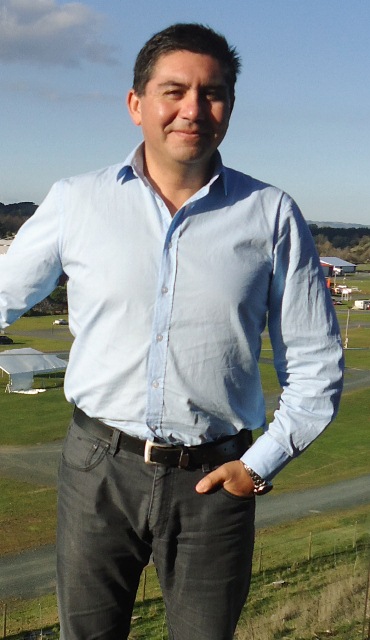
But he isn’t stopping there.
He researches any unfamiliar culture before dealing with a person from it.
“You need to know everything you can about the person that’s going to be in front of you,” says Mieres, “because they know everything about you.”
He feels being able to greet a person in their own language opens doors, so he has learnt basic Russian to use with visitors from milk filter company Gera Ltd.
Gera’s export manager Marina Samoylova says the company is looking forward to showcasing its milk-refining filters at Fieldays.
New Zealand is a desirable destination thanks to its sixth placing on the list of milk-producing nations, and the company hopes to find distribution partners.
Also coming from afar is a US-sponsored group of Afghani company owners and senior executives of agricultural businesses, who aim to make global links to develop their economy.
As well as checking out exhibits, the delegation will meet groups like Federated Farmers, and participate in an agricultural tour.
And what keeps bringing in foreign visitors?
Mieres says it is New Zealand’s reputation for developing technology to solve problems in a simple yet effective way.
NZ Trade and Enterprise publication New Zealand Agribusiness: Local Innovation, Global Solutions says the central North Island is developing a reputation as the Silicon Valley of agribusiness.
And PGG Wrightson Seeds General Manager International Damian Lynch says farmers in New Zealand are good at using new ideas.
“If you can demonstrate the technology has value, it gets taken up very quickly.”
Mieres agrees, saying firms like Gallagher, Livestock Improvement Corporation(LIC) and other companies have forged a reputation for New Zealand’s farming technology in areas like the United States, Europe, and South America.
“Now, more than ever, [New Zealand] has become more relevant,” says Mieres. “Everybody wants to try to get part of the technology being developed in New Zealand, has been used here for years, to be able to increase their production at a low cost.”
“That is the purpose, basically, of Fieldays: to showcase internationally what we have to offer – not just locally – and also the purpose of the New Zealand Agribusiness Centre: to help those countries that want to go to international markets.”
Mieres still fondly recalls volunteering as an interpreter in the International Business Centre at Fieldays soon after completing his study at the University of Waikato.
“It was, and it still is, an amazing place for me,” he says.
“I did the circle. Now I’m in charge of the place where I started, so it’s fantastic.”


